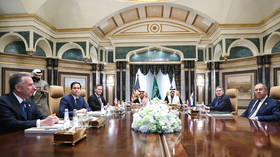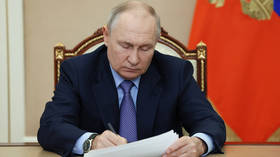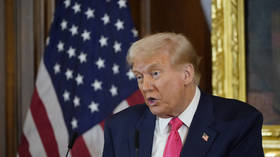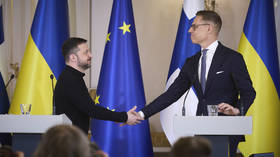North Korea assembles long-range missile
North Korea has started to assemble a long-range missile which is capable of reaching the United States, South Korean media reported on Wednesday.
The missile is believed to be a version of the rocket which North Korea fired in April.
It has a range of up to 65,000 kilometers, which would put the American state of Alaska within reach.
Reports say the rocket could be tested in mid-June.
U.S. military officials also confirm that an intercontinental ballistic missile was being prepared at the base in the north-west of the country.
But the Pentagon says American anti-missile defense systems are capable of intercepting the North Korean rocket.
South Korean media report that soon Pyongyang could also test four more mid-range missiles.
According to Anatoly Tsyganok, head of the Center for Military Forecasting, in the last two years, North Korea has been steadily turning towards hostility – this time not only to its Asian neighbors and the U.S, but also to Russia and China. He said that the echo of a future North Korean nuclear test might long be heard in the areas closest to the country.
“Last week's test was conducted underground and its aftermath is earth-bound, but suppose the North Koreans choose have a test in the air. That will be a very different outcome,” he said. “If they do it in the next few months, the wind will take the radioactive remains of the blast towards Japan and further, but if a test is held in September or October, the winds will blow towards Russia and China, and that will be a very grave issue.”
And while the UN Security Council is working towards a resolution in response to North Korea’s recent nuclear and missile activities, a Russian envoy in the organization, Vitaly Churkin, announced that the document will not impose an “economic embargo.”
“It is very important that the resolution should be verified, that it should focus on the problem of the danger of proliferation of nuclear weapons and missile technology,” he said. “And that, despite the measures that would be taken, including financial measures, this resolution should not lead to the deterioration of the position of the civilian population of North Korea."
The official noted that the Security Council should try to persuade the country to return to six-nation negotiations on its nuclear program, which includes North Korea, South Korea, the United States, Russia, Japan, and China.
He said that returning to the negotiation table will bring economic benefits to North Korea.
Churkin pointed out that there were not only promises, but also concrete deeds to provide economic support to the country in exchange for disassembling its nuclear assets.
The official said that, although not all countries had fulfilled their obligations of financial help on time, returning to the talks would help North Korea to normalize relations with a number of countries, and would be “a good way to solve its economic problems.”













